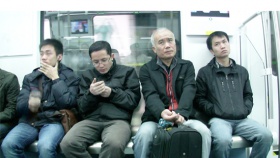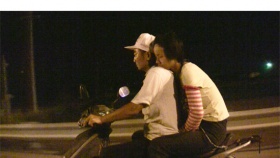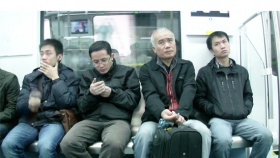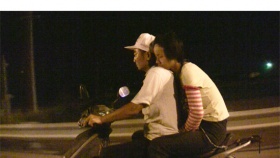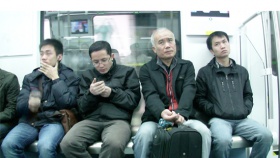The Other Side
Country:
- Taiwan
Language:
- Mandarin
- Urban
- Rural
- Family
- Politics
- History
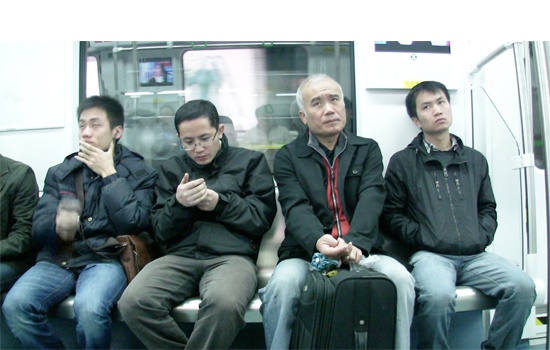

Synopsis
Image Copyright © TSAI Tsung-lung. All Rights Reserved.
Since 1895, Taiwan and China have always been two countries with distinct and separate governments, except for a very short period of time after World War II. The animosity that separated the two peoples is as wide as the 300-kilometer Taiwan Strait that sits between the two countries. In the 1980s both countries finally allowed for cross-strait trade and tourism, all the while 3000 Chinese missiles continue to aim at Taiwan in order to keep this small but ever-rising democracy in its place. When the KMT returned to power in 2008, in an effort to rescue the declining Taiwanese economy, business and trade with China became a priority.
Within this unique cross-strait exchange, over 280 thousand “China brides” and over 300 thousand “Taiwanese Expat” were the first wave of “imports” into “the other side.” These brides and businessmen carry with them hopes and dreams for a better life or, at the very least, a chance to start over. Yet what they know of the country that lies across the way is limited, and the stark reality that greets them is a rude awakening.
KE was born in Wanhua District of Taipei, Taiwan. Debt-ridden after a lifetime of failed business ventures, he leaves for China. But like most Taiwanese businessmen he doesn’t like China and only goes in hopes to find a way to start over. But either KE has the worst luck or he just can’t play by the rules in China, after 10 years of hustling, KE just can’t seem to “make it” in order to go back to Taiwan. KE now faces being labeled a “Taiwanese refugee” in China.
Li-li, a Chinese woman, immigrated to Taiwan by marrying a Taiwanese. However, the marriage didn’t lift her out of labor class into middle class. Having married into a farming family Li-li toils away on the farms. In addition to serving her in-laws, she must also take care of 3 daughters left behind by her husband’s ex-wife. The roles Li-li must take on as daughter-in-law, stepmother, wife, as well as her parenting become the source of contention between Li-li and her husband.
KE’s only wish now is to save some money for his young son and to visit his ailing mother in Taiwan. But when his livelihood is dependent on others, his wishes are hard to achieve. Li-li doesn’t have the right to vote in Taiwan but embraces Taiwanese democracy. She wants to open up her own business in order to help her aging parents. But when Li-li and her husband can’t see eye to eye, her loneliness makes her wish for China.
The realities and dreams, like the distance between Taiwan and China, can seem so close yet so far.
Text Source: CNEX
http://www.cnex.org.tw/cnex_en.php?id=138
Director Statement
Image Copyright © TSAI Tsung-lung. All Rights Reserved.
The starting point for The Other Side came from a project conducted by CNEX, in which Chinese filmmaker ZHOU Hao and I were invited to coproduce a documentary exploring the relationship between the people on both sides of the Taiwan Strait. The initial collaboration didn't get off the ground, so I decided to embark on my own version of The Other Side. Over the course of three years, I traveled to many coastal and inland cities in China. Just like KE, the protagonist in the film, I experienced culture shock and many lonesome moments.
Li-li and her husband A-Wen are friends of my wife’s and mine. Li-li has been in Taiwan for four years now and we see them frequently. Because of our friendship, I’m able to bear witness to the trials and tribulations of a Chinese immigrant in Southern Taiwan, as well as the turbulence in a marriage when the couple is from different cultural backgrounds.
I've been told that assimilation and overcoming cultural differences happens even for those migrating between the northern and southern parts of Taiwan. However, the challenges that KE and Li-li encounter are far greater than those moving within Taiwan. Their emotions and attitude aren't politically motivated, so when they face setbacks in their adopted countries, they’re unable to find footing.
Although they made the choice to immigrate and really had no one to blame, while documenting them, I detected an underlying social injustice that can be the cause of their misfortune. I took an objective approach to tell this story, so I cannot judge their success or failure since it’s all related to their environments. My goal is for the audience to see what lie beneath the banner of cross-strait coexistence are weakness and helplessness of these nobodies. They don’t know each other, but their lives parallel and echo each other. Neither inspirational nor critical, I simply want to show that between China and Taiwan, the path to obtaining one’s dream isn't a straight one.
Text Source: CNEX
http://www.cnex.org.tw/cnex_en.php?id=138
Festivals & Awards
2012 CNEX Documentary Film Festival
2012 CNEX Documentary Film Festival
Team
- Director
- Executive Production

